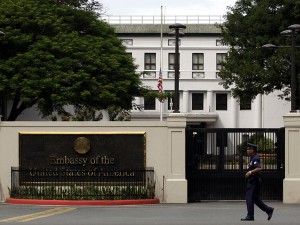MANILA, Philippines — The government on Sunday scrambled to tighten security around the US Embassy in Manila and other potential targets for attacks following a global alert on Al Qaeda-linked jailbreaks in several countries.
Following the Interpol alert that prompted the shutdown of US embassies in some countries, National Security Adviser Cesar Garcia ordered a “hardening of targets” and intensification of intelligence gathering across the country.
“We consulted the National Security Adviser and the NSA had advised us that we are already intensifying intelligence-gathering and we continue the hardening of targets, which are the focus of these alerts such as the US Embassy,” deputy presidential spokesperson Abigail Valte said over radio.
The hardening of targets and intensification of intelligence gathering were meant “to address the issues that are raised in the alert,” Valte said.
“That just means essentially that we are heightening measures for the focus of the alerts, such as the US Embassy,” she said over government-run dzRB, explaining the hardening of targets.
Valte said the government could not divulge the security measures for obvious reasons.
“We can’t divulge the security measures because that is like telling those people who wanted to cause harm that ‘these are the things that you should go against’,” she said.
Interpol issued a global security alert Saturday following jailbreaks across nine countries that had been linked to Al Qaeda. It said the jailbreaks had led to the escape of hundreds of terrorists and other criminals in the past month.
The global police agency also asked 190 member countries to help establish whether the events were coordinated, and help to avert more jailbreaks.
The US shut down at least 22 embassies or consulates in Islamic countries while other countries closed their missions in some Middle East countries.
According to Interpol, August is the anniversary of attacks in India, Russia and Indonesia.
General Martin Dempsey, chairman of the Joint Chiefs of Staff, said the threats were directed at Western interests, and were “more specific” than previous threats, according to reports.
Valte declined to comment on whether the July 26 explosion inside a restaurant in Cagayan de Oro City that killed eight people and injured scores of others had any link with the Al Qaeda. She, however, said the Interpol alert pointed to potential Western targets for attacks.
“If these people read the actual Interpol alert, it speaks of identified areas like the Arabian Peninsula, as well… and the threat is allegedly directed to Western targets,” she said.
In March 2005, after the Valentine’s Day bombings that killed 12 in General Santos and Davao cities, police intelligence officials told the Senate that the Jemaah Islamiah, an al-Qaeda-linked group suspected of plotting to establish a pan-Islamic state across Southeast Asia, continued to provide funding for terror attacks in the country.
Related stories:
Interpol, US worldwide security alerts spark embassy closures
Top US officials meet to discuss embassy threat
